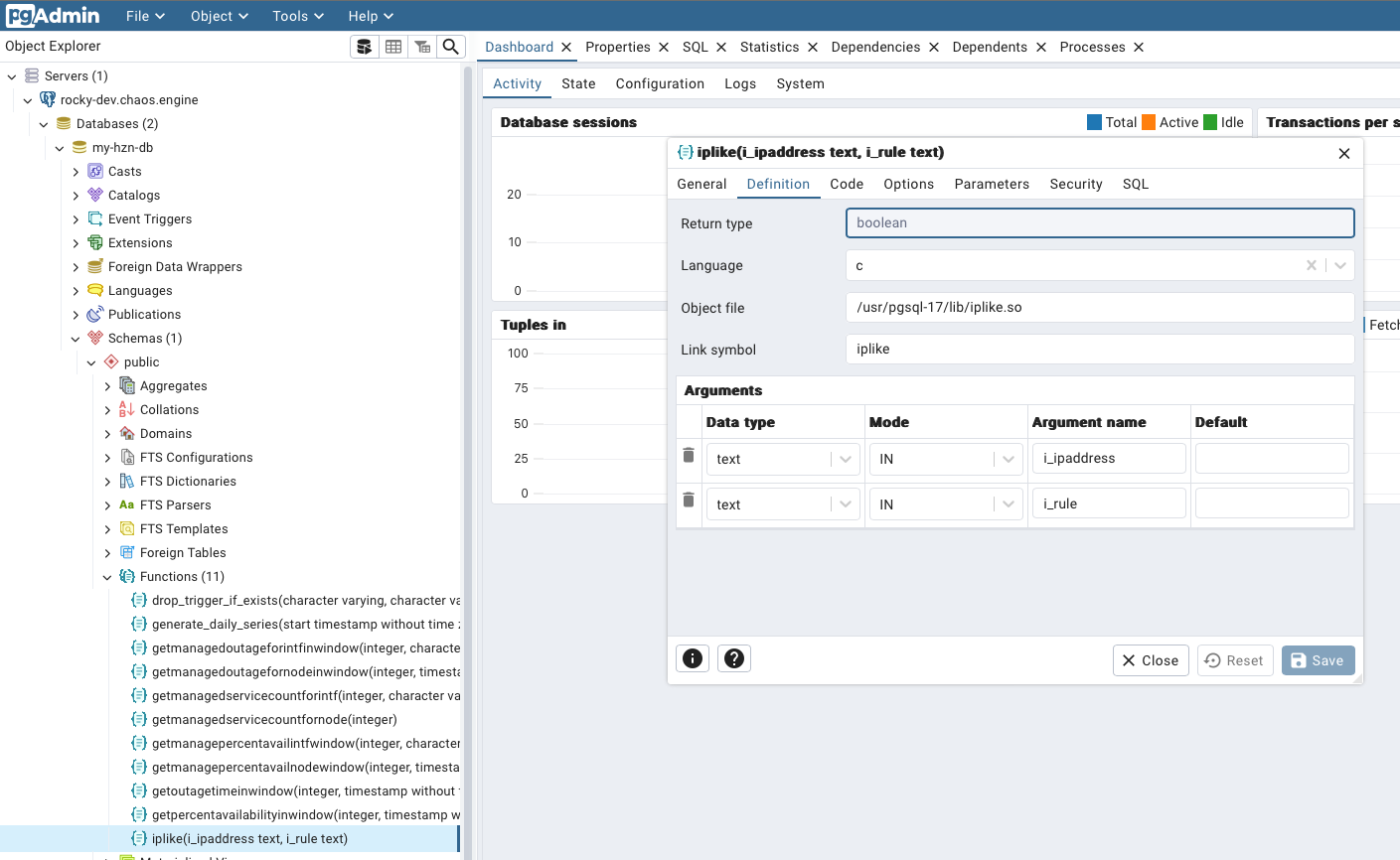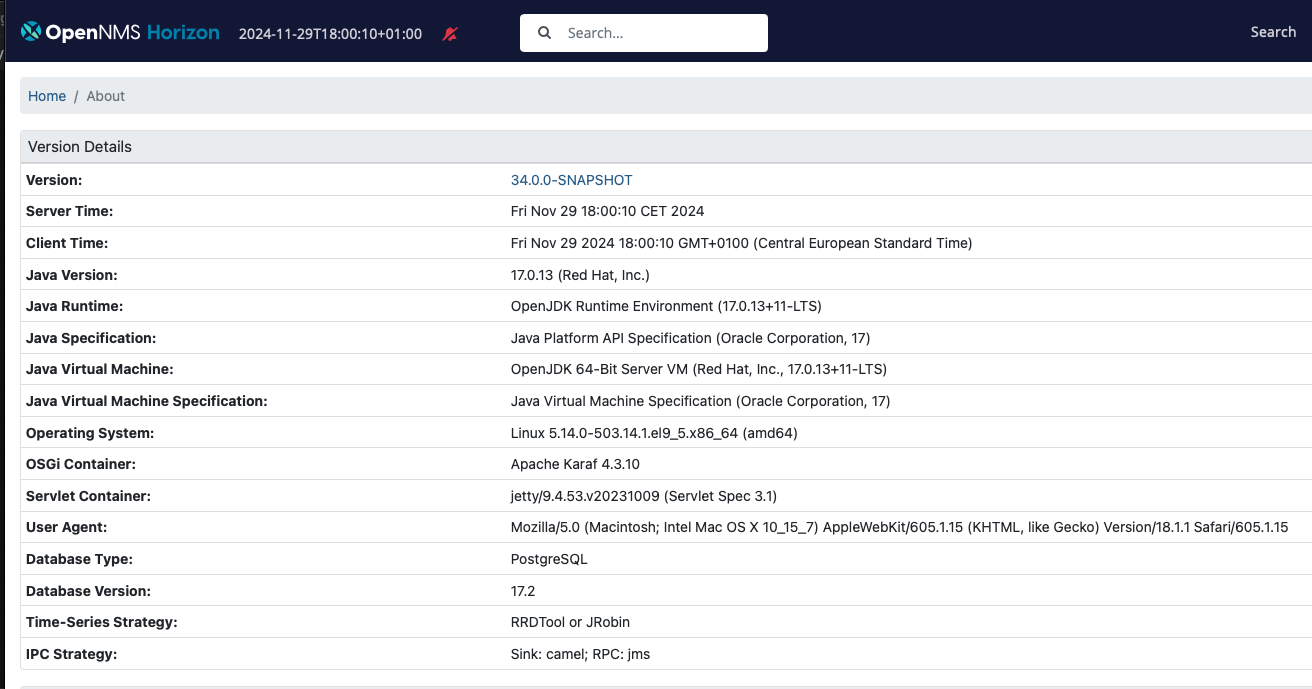Demystifying iplike in OpenNMS Horizon
As described in the previous article we have built and installed an OpenNMS Horizon Core component from the source.
With setting up the database schema with ${OPENNMS_HOME}/bin/install -dis a function IPLIKE is created for the OpenNMS database.
It allows us to get IP address matches for IPv4 and IPv6 addresses with filters used in all IP filters in the tool, e.g. IPADDR IPLIKE 192.168.0-3.0-255.
By default, the function is implemented in a SQL procedural language (PL/pgSQL).
As OpenNMS had to deal with larger IP address inventories, an optimized version in C was created which is available as the IPLIKE package.
The C version of this stored procedure has to be built against header files from specific PostgreSQL major versions.
This is the reason you see iplike-pgsql{12,13,14,15} packages in the OpenNMS repositories.
If you don’t install the iplike package a plpgsql function will be created.
You can verify the IPLIKE implementation language by connecting to your database and inspecting the details of the iplike function.
[rocky@rocky-dev iplike]$ psql -U my-hzn-user -d my-hzn-db -h localhost
Get the details of the iplike function with
my-hzn-db=> \df+ iplike
The first line in the column Language should give you plpgsql followed by the function itself.
public | iplike | boolean | i_ipaddress text, i_rule text | func | volatile | unsafe | opennms | invoker | | plpgsql |
💁♀️ If you use a tool like pgadmin you can inspect the function implementation very easily.
You can test the function with an SQL command and enable \timing to measure the execution time.
In the example, I have loaded ~16k Nodes into the inventory with a unique address from the 10.0.0.0/18 IP range.
my-hzn-db=> \timing
Timing is on.
my-hzn-db=# select count(IPLIKE(ipaddr,'10.*.*.*')) from ipinterface;
count
-------
16391
(1 row)
Time: 194.280 ms
Matching addresses takes ~194 ms with the plpsql implemented function. If we do the same thing with the C-implemented iplike function you will see the following output:
my-hzn-db=# \df+ iplike
Schema | Name | Result data type | Argument data types | Type | Volatility | Parallel | Owner | Security | Access privileges | Language | Sourc
e code | Description
--------+--------+------------------+-------------------------------+------+------------+----------+----------+----------+-------------------+----------+-------------+-------------
public | iplike | boolean | i_ipaddress text, i_rule text | func | volatile | unsafe | postgres | invoker | | c | iplike |
(1 row)
Running the same query against the inventory gives the following output:
my-hzn-db=> \timing
Timing is on.
my-hzn-db=# select count(IPLIKE(ipaddr,'10.*.*.*')) from ipinterface;
count
-------
16391
(1 row)
Time: 19.093 ms
As you can see we have a 10x faster response from the C-implemented function. The iplike function helps to reduce the internal latency of the monitoring system which allows us to deal with larger workloads.
Build Iplike from source
If you want to use newer PostgreSQL versions where OpenNMS hasn’t published RPM or Debian packages, you can build the functions from the source code.
Requirements:
- Rocky Linux 9 minimal server install
- Access to public Rocky Linux package repositories
- Access to the official PostgreSQL package repositories
- Access to GitHub and git
- Working directory is the home directory for a user
rocky(/home/rocky) - Make sure you don’t have an OpenNMS Horizon Core instance running
Install the PostgreSQL repository and the development header files from the major version you want to run in your environment. I use PostgreSQL 17 here as an example.
Install the build dependencies
sudo dnf install -y autoconf libtool
You need to install the Rocky Linux Code Ready Builder (crb).
sudo dnf config-manager --enable crb
Without access to the crb repository, you get the following error message when you try to install the postgresql17-devel package:
Error:
Problem: cannot install the best candidate for the job
- nothing provides perl(IPC::Run) needed by postgresql17-devel-17.2-1PGDG.rhel9.x86_64 from pgdg17
(try to add '--skip-broken' to skip uninstallable packages or '--nobest' to use not only best candidate packages)
Install the official PostgreSQL 17 repository, server, and developer files.
sudo dnf install -y https://download.postgresql.org/pub/repos/yum/reporpms/EL-9-x86_64/pgdg-redhat-repo-latest.noarch.rpm
sudo dnf install -y postgresql17-server postgresql17-devel
Checkout the source code from GitHub.
git clone https://github.com/opennms/iplike
Get the git submodules for autotools.
cd iplike
git submodule update --init
Generate the configure scripts.
./configure
You will get an error message.
configure: error: PostgreSQL is required
You need to tell the configure script the location of your pg_config binary for the version you want to use.
./configure --with-pgsql=/usr/pgsql-17/bin/pg_config
Compile and install the library with
make && sudo make install
The libraries and an install script are installed in the following locations:
ls -l /usr/pgsql-17/lib/iplike.*
-rwxr-xr-x. 1 root root 915 Nov 29 17:19 /usr/pgsql-17/lib/iplike.la
-rwxr-xr-x. 1 root root 59176 Nov 29 17:19 /usr/pgsql-17/lib/iplike.so
ls -l /usr/local/sbin/*iplike*
-rwxr-xr-x. 1 root root 2189 Nov 29 17:19 /usr/local/sbin/install_iplike.sh
Initialize the PostgreSQL 17 database.
sudo postgresql-17-setup initdb
Prepare the database for the OpenNMS Horizon installation.
sudo -i -u postgres createuser -P my-hzn-user
Set a secure password, in this example, I use my-hzn-user-pass as a password to describe these steps.
Create a database and set the owner accordingly.
sudo -i -u postgres createdb -O my-hzn-user my-hzn-db
Set a secure password for the postgres user.
sudo -i -u postgres psql -c "ALTER USER postgres WITH PASSWORD 'my-postgres-pass';"
Install the iplike function into the OpenNMS Horizon database.
[rocky@rocky-dev iplike]$ /usr/local/sbin/install_iplike.sh -d my-hzn-db
Password for user postgres:
CREATE FUNCTION
Initialize the database schema for OpenNMS Horizon.
sudo -u opennms /opt/opennms/bin/install -dis
You get an “Unsupported database version” error message.
17:37:33.696 [Main] INFO org.opennms.core.schema.Migrator - validating database version
java.lang.reflect.InvocationTargetException
at java.base/jdk.internal.reflect.NativeMethodAccessorImpl.invoke0(Native Method)
at java.base/jdk.internal.reflect.NativeMethodAccessorImpl.invoke(NativeMethodAccessorImpl.java:77)
at java.base/jdk.internal.reflect.DelegatingMethodAccessorImpl.invoke(DelegatingMethodAccessorImpl.java:43)
at java.base/java.lang.reflect.Method.invoke(Method.java:569)
at org.opennms.bootstrap.Bootstrap$4.run(Bootstrap.java:524)
at java.base/java.lang.Thread.run(Thread.java:840)
Caused by: org.opennms.core.schema.MigrationException: Unsupported database version "17.200001" -- you need at least 10.000000 and less than 17.000000. Use the "-Q" option to disable this check if you feel brave and are willing to find and fix bugs found yourself.
at org.opennms.core.schema.Migrator.validateDatabaseVersion(Migrator.java:337)
at org.opennms.core.schema.Migrator.setupDatabase(Migrator.java:1008)
at org.opennms.install.Installer.install(Installer.java:248)
at org.opennms.install.Installer.main(Installer.java:1009)
... 6 more
You need to run the install tool with the option -Q to ignore the database version.
sudo -u opennms /opt/opennms/bin/install -disQ
Verify the language of the installed iplike function.
[rocky@rocky-dev iplike]$ psql -U my-hzn-user -d my-hzn-db -h localhost
Password for user my-hzn-user:
psql (17.2)
Type "help" for help.
my-hzn-db=> \df+ iplike
List of functions
Schema | Name | Result data type | Argument data types | Type | Volatility | Parallel | Owner | Security | Access privileges | Language | Internal name | Description
--------+--------+------------------+-------------------------------+------+------------+----------+----------+----------+-------------------+----------+---------------+-------------
public | iplike | boolean | i_ipaddress text, i_rule text | func | volatile | unsafe | postgres | invoker | | c | iplike |
(1 row)
my-hzn-db=>
Start OpenNMS Horizon core with
[rocky@rocky-dev iplike]$ sudo systemctl start opennms
Login to your OpenNMS Horizon Core web user interface and you should now run on the latest and greatest PostgreSQL 17.2 version.
gl&hf
What can we do next?
There are now additional steps we can take from here, most notably:
- JNA vs. JNI ICMP performance implications
- Compile and install RRDTool support using JRRD2
- Building Core, Minion, and Sentinel RPM packages
- Create Docker container images
Stay tuned and so long


